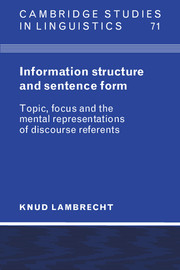 Information Structure and Sentence Form
Information Structure and Sentence Form 3 - The mental representations of discourse referents
Published online by Cambridge University Press: 05 June 2012
Summary
Discourse referents
In the present chapter I will be concerned with the nature of the representations of the referents of linguistic expressions in the minds of interlocutors. In particular, I will be concerned with the changes which these mental representations may undergo in the course of a conversation and with the linguistic forms which code these changes. The set of representations which a speaker and a hearer may be assumed to share in a given discourse will be called the discourse register. As indicated in the remark in Section 2.1, I will tend to neglect the terminological (but not the conceptual) distinction between referents and the mental representations of referents in a discourse. It is primarily the latter that I will be concerned with in the following discussion.
Discourse referents may be either entities or propositions. A proposition may acquire the status of a discourse referent once it is assumed by a speaker to be known to the addressee, i.e. once it has been added to the set of pragmatic presuppositions in the discourse register. The mental representation of such a propositional referent may then be stored in the register together with the representations of entities. Like expressions denoting entities, those denoting presupposed propositions may serve as arguments of a predicate.
Information
- Type
- Chapter
- Information
- Information Structure and Sentence FormTopic, Focus, and the Mental Representations of Discourse Referents, pp. 74 - 116Publisher: Cambridge University PressPrint publication year: 1994